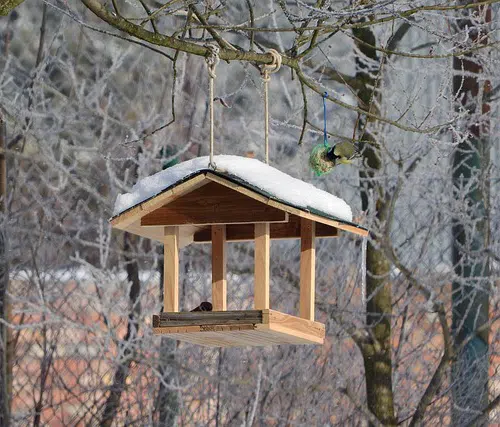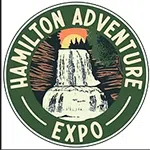Many homeowners and property managers set up bird feeders to attract songbirds, especially during colder months. Unfortunately, bird feeders are also a major attractant for raccoons—intelligent, nocturnal, opportunistic, and highly adaptable animals.

As temperatures drop, raccoons seek easy food sources, and bird feeders are one of their top winter targets. Let's explore what you can do to get rid of raccoons and keep them out of your feeders in the future. Keep in mind that DIY deterrents and gadgets are rarely all that effective, but Hawkeye Bird & Animal Control offers legal and permanent raccoon removal services in the GTA.
Why Raccoons Are Attracted to Bird Feeders
- Food Availability
Spilled seeds and suet provide the high-calorie nutrition that raccoons need to survive the winter. Both black-oil and striped sunflower seeds are among their favorites. On that note, you might also fin squirrel and skunk visitors around your bird feeder. - Easy Access
Raccoons are agile climbers and can easily reach most bird feeders, poles, or decks. - Nighttime Feeding
Unlike birds, raccoons are active at night, so there's no competition around the feeder and the mess you find in the morning may well signal a raccoon visit. - Smell and Habits
Raccoons have an excellent sense of smell that can lead them to your bird feeder. And once they find a reliable food source, they keep returning.
How Raccoons Cause Problems Around Bird Feeders
- Damage:
- Bending poles, breaking feeders, and tearing mounts.
- Damaging nearby deck railings or roof gutters while climbing.
- Health risks:
- Droppings on patios and decks contain roundworm and other pathogens.
- Risk of contamination near outdoor furniture and children’s play areas.
- Secondary infestation risks:
- Raccoons attracted to feeders often explore nearby attics, chimneys, and crawl spaces for shelter.
- Bird feeders act as “gateway attractants” leading to full property infestations.
Recognizing Raccoon Activity Around Your Bird Feeder
- Feeder emptied overnight.
- Tracks or muddy paw prints on decks or railings.
- Torn suet cages or feeder poles bent.
- Scattered seeds and droppings under the feeder.
- Noises at night near decks or walls.
Pro Tip: Inspect your feeders early in the morning for signs of nocturnal visitors.
DIY Raccoon Control and Removal Mistakes People Make
- Using so-called “raccoon-proof” feeders often fail; raccoons are quite determined and agile and often outsmart them.
- Applying home remedies like cayenne pepper or sprays - these get washed away by rain or snow and would need to be reapplied frequently.
- Trapping and relocating raccoons within 1 km — although, this distance is required by law, it is ineffective, as raccoons almost always return.
Preventive Measures to Keep Raccoons Out of Bird Feeders
- For Homeowners and Condo Residents
- Bring feeders indoors at night.
- Use a seed catcher tray to minimize spillage.
- Clean the area below the feeder regularly.
- Avoid placing feeders near fences, decks, or roofs that can help raccoons access your bird feeder.
- Secure garbage and compost bins nearby—raccoons are attracted to multiple food sources.
- For Commercial or Multi-Unit Properties
- Install motion-sensor lighting near landscaped feeding areas, although this is a very short-lived deterrent.
- Regularly inspect landscaped gardens and maintenance yards for raccoon signs.
- Maintain proper feeder height and distance from walls or utility poles.
What to Do If Raccoons Keep Returning Despite Precautions
- Persistent raccoon visits often indicate nesting nearby and warrants a closer look at sheds, roofs, attics, or under decks.
- Avoid confronting raccoons—they may be aggressive if cornered, especially if babies are nearby.
- Call professionals for permanent raccoon removal. Hawkeye Bird & Animal Control is the only wildlife specialist to offer this service across the GTA. Permanent removal guarantees that the animal(s) will not return.
 Seasonal Considerations: Why Winter Is a Critical Time
Seasonal Considerations: Why Winter Is a Critical Time
Feeding our songbirds is especially important during the winter months. Raccoons agree and wish to participate. Here's why:
- Winter scarcity pushes raccoons to explore urban food sources more aggressively.
- Bird feeders, compost bins, and pet food left outdoors act as magnets.
- Frozen soil limits natural foraging, making human-provided food the primary source.
- Early winter inspections and timely intervention will prevent spring nesting near feeder areas.
Long-Term Prevention After Raccoon Removal
- Install raccoon barriers like Electric Shock Tracks on decks, railings, and fences.
- Clean droppings and disinfect affected soil or decking.
- Use bird feeders with tight-fitting lids and sturdy poles. Raccoons can weigh up to 20lbs.
- Consider installing raccoon baffles on your feeders.
- Regularly monitor for signs of re-entry or new nesting sites.
- Educate tenants, residents, and the public at large on wildlife feeding policies.
FAQs: Raccoons Around Bird Feeders
Q: Can raccoons damage my deck or siding while climbing for feeders?
A: Unfortunately, raccoons damaging decks and feeders, as well as siding, is a common issue. They can leave deep claw marks when climbing on wooden structures or vinyl siding. Urine and feces also leave lasting stains, corrode structures, and pose serious health risks.
Q: How do I know if raccoons have nested near my bird feeder?
A: Tell-tale signs include spilled seeds overnight, raccoon tracks (paw prints), and droppings near your bird feeder.
Q: Is there a way to secure my bird feeder?
A: You can try to secure your feeder by installing a raccoon baffle (not squirrel baffle!). Raccoon baffles are fairly large, usually around 10" in diameter and about 2 feet tall and are designed to prevent raccoons from reaching or draping over the feeder. Proper placement and installation are of vital importance.
Q: Are raccoon deterrent sprays safe or effective?
A: Deterrent sprays have little efficacy and need to be reapplied after any rain or snow fall.
Q: What should I do if I find raccoon droppings under the feeder?
A: Call a professional. Cleaning and disinfecting raccoon droppings requires safety protocols and PPE. Raccoon feces contains Baylisascaris Procyonis, also known as raccoon roundworm.
Q: How much does professional raccoon removal in the GTA cost?
A: Residential raccoon removal ranges from $175 to $250 per wildlife technician visit, depending on how many raccoons there are and how many traps are required.
Q: Can raccoons spread diseases to birds through shared feeders?
A: Transmission of parasites or pathogens to birds is highly unlikely. However, dogs and cats can be at risk if water is shared with a rabies infected raccoon or if they’re exposed to raccoon roundworm or other pathogens through droppings.
Q: How do professionals get rid of raccoons eating bird seed and permanently prevent them from returning?
A: The only permanent method is to capture raccoons in live traps and legally and humanely euthanize them. Learn more about permanent removal here: https://www.hawkeye.ca/permanent-wildlife-removal
Q: Will removing my bird feeder make raccoons leave my yard automatically?
A: If your bird feeder is the only food source on your property, removing it may make raccoons move on. However, it is much more likely that raccoons chose your yard for multiple reasons such as shelter and/or proximity to other available food.
Final Thoughts on Keeping Raccoons Out of Bird Feeders
Bird feeders and their winged visitors are enjoyable, but they must be managed responsibly. Raccoons snacking on your bird feed can quickly turn into property damage and infestations. When prevention fails, a licensed professional like Hawkeye can ensure permanent, legal removal across the GTA. Guaranteed.
Contact Hawkeye Bird & Animal Control today and stop raccoons from invading your bird feeders.
Early intervention helps keep your property—and local wildlife—safe year-round.
Our licensed and experienced wildlife technicians are dispatched to areas all across Southern Ontario, including Toronto, Scarborough, Brampton, Vaughan, Markham, Ajax, Pickering, Newmarket, Etobicoke, Oshawa, and Mississauga.
Related Articles:
https://www.hawkeye.ca/raccoon-control-trapping-and-removal
https://www.hawkeye.ca/blog/how-to-permanently-remove-raccoons-in-vaughan
https://www.hawkeye.ca/blog/how-to-get-rid-of-raccoons














